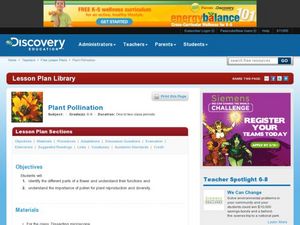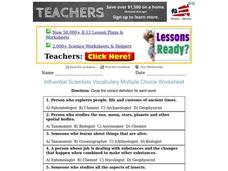Curated OER
Prairie Restoration and Prairie Ecology
Students collect data as they identify and classify native prairie plants and insects. They create their own population study using a variety of sampling techniques to determine the population density of various species. Students...
Curated OER
Food Chain
Third graders explore why food chains are important. In this food chain lesson, 3rd graders break into small groups to represent parts of the food chain. Different amounts of food are given to each group and any spilled food will be...
Curated OER
Goldilocks and the Real Bears
Students participate in a comparison lesson where they compare fictional bears to real life bears. In this science/language arts lesson, students read Goldilocks and the Three Bears. Students observe characteristics of these fictional...
Curated OER
Reading "Beetles, Bees and Butterflys"
Reading information about beetles, bees, and butterflies is the focus of this science instructional activity. Students apply vocabulary and comprehension skills in order to answer six questions based on the reading.
Curated OER
Pollination Parties
Young scholars discuss the pollination of bees and butterflies. In this pollination lesson,students complete a worksheet answering questions about an imaginary bee pollination company. Young scholars understand the relationship...
Curated OER
Plant Pollution
Middle schoolers study the different parts of a flower and their functions. In this pollination lesson students study a flower under a microscope.
Curated OER
What's Bugging You?
Students examine the effects of pests on other organisms, crops, and the environment. they construct an insect observation chamber and discover how some insects can be pests in some situations and beneficial in others. They write "pest...
Curated OER
Small Pond Creatures
Students complete a unit about the different creatures that can live in a small pond habitat. They create a glossary, create a class Small Pond mural, develop a Frog Fact File, read a variety of books, and conduct research for a report...
Curated OER
Introduction to Spiders
Students discover various facts about spiders including different species, body parts, and types of webs. In this insect biology instructional activity, students begin a K-W-L chart about spiders, are read I Love Spiders by John Parker...
Curated OER
Magical Metamorphosis
Students explore the life cycle of the butterfly and the process of metamorphosis through the creation of painted life cycle habitat. They place each part of the cycle in the correct location through the use of a visual diagram.
Curated OER
Invertebrate Vocabulary-- Marine Invertebrate Match
In this science worksheet, students study 12 vocabulary words which pertain to marine invertebrates. Students read the definitions which include pronunciation, part of speech and meaning of the name. Students then look at 16 organisms...
Curated OER
Too Bee Or Not To Bee
Students recognize that bees are important in the reproduction of plants and to the survival of animals. In this bee lesson, students become familiar with the parts of bees and how those adaptations help them pollinate plants. Students...
Curated OER
Fun with Plants Flower Power
Students understand the parts of the flower. In this flower lesson, students perform experiments to see where seeds come from. Students complete a data sheet about the experiment. Students understand the terms pistil and stamen.
Curated OER
Milkweed and Monarch Butterfly Mania
Students explore Earth science by completing a worksheet in class. In this botany instructional activity, students identify the relationship between the Milkweed plant and the butterflies which regularly feed on its nutrients. Students...
Curated OER
Mountains
Explore the mountain habitat with this collection of slides. The climate is described, along with the associated plant and animal life. Some of the pictures are attractive, but some leave much to be desired. There is a generous amount of...
Curated OER
Arthropod Mouth Parts and Food
Students identify the different types of mouths arthropods have for eating various types of food. Given photographs of the different types of arthropods, students identify which mouth they have and what type of food they can eat with...
Curated OER
Honey Bee Biology
Students review the basic parts of an insect and explore the anatomical characteristics of a honey bee. The second part of the lesson focuses on ways to identify a honey bee from other stinging insects.
Curated OER
Identifying Organisms
In this organisms activity, 9th graders look at each picture of insects and use the key at the bottom of the sheet to determine which order they belong to. Then they explain which insect is a true bug and which is a true beetle and...
Curated OER
Build Your Own Bug
Students create a unique bug. In this lesson about bugs, students use their imagination to develop a new kind of bug. Students use construction paper, scissors, glue, and crayons to make their bug. Students explore the different parts of...
Curated OER
The Honey Bee Body - Paper Honey Bee
Students construct a paper honey bee to learn the six major parts of a bee and other insects. They compare their own body parts to those of bees. They utilize worksheets imbedded in this plan to help them design their bee.
Curated OER
What Bees Eat
Students study plant and animal interdependence by studying bees and pollination. In this interdependence lesson, students discuss flower parts and dissect it to show its reproductive parts. Students then use tissue and pipe cleaners to...
Curated OER
Major Functions
Seventh graders investigate the basic characteristics and needs of living things. They identify the major parts of plants and animals by making lists. Students focus upon one living thing and speculate how if one part is changed how it...
Curated OER
Anthropods and Echinoderms
Students examine the attributes of crickets. In this arthropods lesson, students observe crickets and sketch and label their parts. Students respond to questions regarding their observations.
Curated OER
Influential Scientists Vocabulary Multiple Choice Worksheet
In this influential scientists worksheet, students read the definitions of 19 science professions. From 4 choices, students choose the correct name of the job that fits the definition. Example: studies birds (ornithologist).

























